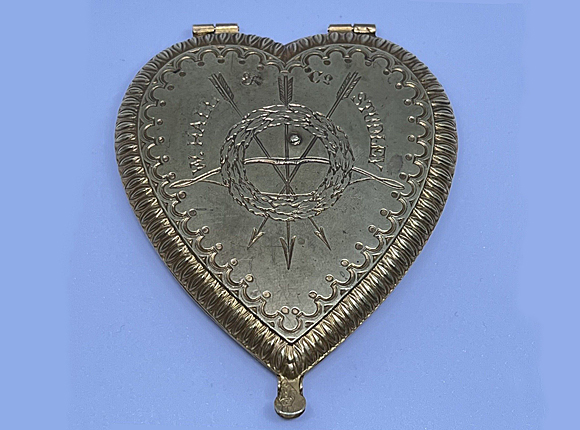Bow and Arrows on Heart
Formerly known as the Heart

Needle Case (photos from eBay)

Design Representation
Design Details
Needle Case Type: |
Figural |
Patent/Registered to: |
Thomas Kendrick - Birmingham |
Patent/Design Representation #: |
Ornamental Class1: Metal: #266571 (Provisional Design #1042 registered February 3, 1872) |
Patent/Design Registration Date: |
September 24, 1872 |
Location of Patent/Design Registration: |
The National Archives (TNA) - Kew, UK |
Reference #: |
TNA Representation - BT 43/32/266571
TNA Register - BT 44/3/266571 |
Dimensions: |
Unknown |
Material: |
Brass |
Name Variations: |
Wm. Hall & Co - Studley |
Other Variations: |
None |
Additional Photographs


Left: fully open interior. Right: diamond registration mark.


Open interior insides.
Facts
The bow and arrow is one of the earliest weapons and was used for war and hunting from prehistoric times on all continents except
Australia. After the Norman Invasion of England, the English became expert long bowmen a skill relied on by successive Kings. In
the 13th century it was a law that all men with no more than 100 pence annual income own and maintain bows and arrows in readiness for call
to service. Practice was encouraged to the point that at certain times other sports were outlawed to ensure men concentrated on their
archery skill. The invention of firearms made archers less effective in warfare however archery was maintained as a recreational
pursuit. The first archery society, the Society of Archers, was formed in 1643 and others followed each holding a number of meetings for
competitors each year.

History
In the 1830's archery, which had previously been only for men, gained popularity with women of the upper class. It was one of the first
organised competitive sports approved of for women after Princess Victoria participated in the sport. It was considered a graceful
pursuit suitable for females and archery meetings were an accepted place for unmarried ladies to mix with men. After visiting the Archery
Gardens at the town of St. Leonards with her mother, the Duchess of York, Victoria became patron of the Society of St. Leonards. After her
ascension to the throne it was renamed The Queen’s St. Leonards Archers. At the archery society meetings, competitors would shoot for
prizes, often these were jewellery for the female archers.

Miscellaneous
Excerpt from an article in The Sydney Morning Herald - Jan 14th 1941 describing a residence to
be demolished to build a dock . “And, similarly, the flat itself has been built with a view to housing the numerous treasures
purchased by Mr. Crowle on different world tours. There are special holes in the walls for the lovely Lilique plaques which came from
Paris, and numbers of built-in bookshelves to hold the overflow from Mr. Crowle’s library, which contains, among many other volumes, an
original edition of the “Arabian Nights” and an early edition of Disraeli’s complete works. One of the most unusual innovations designed
by the owner is the glass cabinets which form the dividing walls between the dining-room and the living-room. These contain some of the
smaller curios from the collection, including a charming gold bracelet once worn by Queen Victoria, who won it in an archery contest.”

Princess Victoria with her bow
Note: Right side panel text and photos provided by Lynda Herrod.













